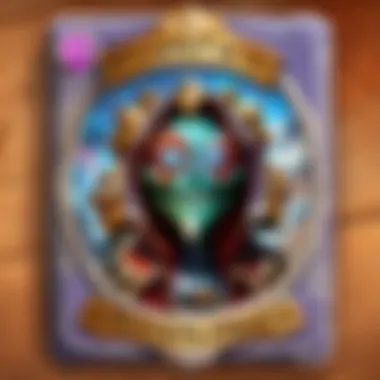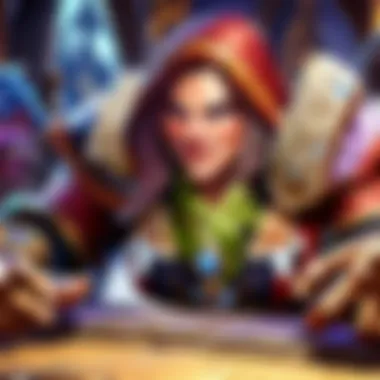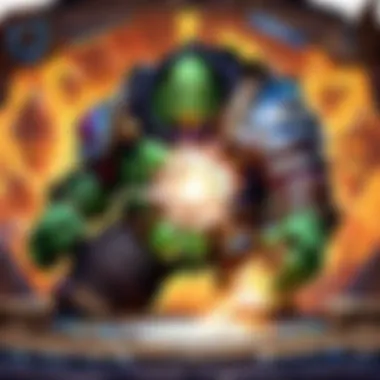Mastering the Art of Deck Management in Hearthstone


Game Updates and Patches
Hearthstone is a dynamic game that frequently receives updates and patches to keep the gameplay fresh and balanced. It is essential for deck managers to stay abreast of these changes to adapt their strategies effectively. By analyzing the latest game updates, deck managers can anticipate shifts in the meta and optimize their deck compositions accordingly. Understanding the detailed breakdown of changes and their impact on gameplay allows players to make informed decisions on card selections and deck building. Additionally, exploring new cards and mechanics introduced in updates provides insights into innovative strategies that can be incorporated into deck management.
Deck Strategies and Meta Analysis
Navigating the vast array of deck options in Hearthstone requires adept strategizing and meticulous analysis. Deck managers can benefit from top deck recommendations tailored to different play styles and skill levels. By delving into the current meta and popular deck archetypes, players can identify trends and refine their deck-building strategies to remain competitive. Moreover, developing strategies for countering prevalent decks and making tech choices enhances a deck manager's versatility and adaptability in various matchups.
Card Reviews and Set Reviews
Thorough evaluations of new cards play a significant role in shaping effective deck management strategies. Examining the potential impact of new cards on the meta allows deck managers to anticipate shifts in deck compositions and prepare appropriate countermeasures. Furthermore, assessing card synergies within different deck archetypes enables players to create cohesive and synergistic decks that capitalize on card interactions. Set reviews focusing on aspects such as value, versatility, and competitive viability aid deck managers in making informed decisions on card selections and overall deck construction.
Player Guides and Tips
For players looking to enhance their deck management skills, a comprehensive guide encompassing beginner's guides, advanced tips, and arena strategies is invaluable. Understanding core game mechanics and strategies is fundamental for mastering deck building and deck management. Advanced tips provide insights into improving gameplay mechanics, decision-making processes, and optimizing deck synergies. Additionally, arena drafting strategies and arena-specific gameplay tips equip deck managers with the knowledge and tactics needed to excel in competitive play.
Introduction
In the intricate world of Hearthstone, mastering the role of a Deck Manager is not merely a task but a true art form that requires finesse and strategic acumen. This guide aims to unravel the mysteries of deck management, providing a comprehensive roadmap for players looking to elevate their gameplay to new heights. By honing your skills as a Deck Manager, you can significantly enhance your competitive edge and unrivaled in-game efficiency, making strategic decisions that can turn the tide of any match in your favor.
Understanding the Role of a Deck Manager
Defining deck management in Hearthstone
Delving into the essence of deck management in Hearthstone reveals a multifaceted process that involves meticulously crafting and fine-tuning decks to perfection. This crucial role revolves around curating cards, predicting opponent strategies, and adapting to the ever-evolving meta landscape. Such versatility and foresight are instrumental in constructing decks that not only align with your playstyle but also outsmart your adversaries, setting the stage for triumphant victories and strategic supremacy.
Importance of strategic deck building
The significance of strategic deck building cannot be overstated in the realm of Hearthstone, as it serves as the cornerstone of a player's success. By understanding the nuanced art of assembling synergistic card combinations, Deck Managers can forge powerful decks that synergize harmoniously, paving the way for seamless gameplay transitions and devastating tactical plays. This pivotal skill empowers players to stay ahead of the curve, adapting their decks to counter prevalent strategies and emerging threats, thus asserting dominance on the competitive battleground.
Responsibilities of a deck manager
Embracing the responsibilities inherent to the role of a Deck Manager requires a meticulous attention to detail and a keen strategic vision. From crafting innovative deck compositions to fine-tuning card selections based on data analytics, Deck Managers shoulder the weight of decision-making that can dictate the outcome of each match. Their expertise extends beyond mere card selection, encompassing matchup analysis, tech choices, and adapting to shifting meta dynamics, demonstrating a penchant for adaptability and foresight that is essential for navigating the demanding Hearthstone landscape.
Significance of Deck Management


Impact on gameplay efficiency
The impact of proficient deck management reverberates throughout gameplay, manifesting in enhanced efficiency and tactical prowess. By mastering the art of deck optimization and streamlined card selection, Deck Managers can wield their decks with surgical precision, maximizing card synergies and minimizing weaknesses. This efficiency translates into fluid gameplay experiences, empowering players to execute complex strategies with finesse and confidence, ultimately culminating in dominant performances that leave opponents in awe.
Strategic advantages in competitive play
In the competitive arena of Hearthstone, strategic advantages are the currency of champions, and Deck Managers are the architects of victory. By leveraging their in-depth knowledge of meta trends, counterplay strategies, and tech choices, Deck Managers can outmaneuver opponents with a strategic finesse that leaves little room for error. This competitive edge not only secures triumphs in high-stakes matches but also solidifies a player's reputation as a formidable force to be reckoned with, earning respect and admiration from peers and rivals alike.
Essential Skills for Deck Managers
In the realm of Hearthstone, mastering the role of a deck manager requires a myriad of essential skills that elevate gameplay to new heights. The significance of possessing these skills cannot be overstated. It is the foundation upon which successful strategies are built and executed. By honing in on analytical abilities, creativity and innovation, as well as resource management, deck managers can navigate the complexities of the game with finesse and precision.
Analytical Abilities
Data analysis for card synergies
Data analysis for card synergies stands as a crucial component in the arsenal of a deck manager. This analytical skill involves delving into the intricate relationships between cards within a deck and how they synergize to create potent combinations. By dissecting card interactions and synergies, deck managers can optimize their deck compositions for maximum effectiveness. The key characteristic of data analysis lies in its ability to unveil hidden patterns and strategic opportunities that might otherwise go unnoticed. It serves as a powerful tool in fine-tuning decks to mirror the player's playstyle and strategic preferences. However, a double-edged sword, as overreliance on data analysis alone may limit creativity and adaptability in deck construction.
Predicting opponent's strategies
Another critical aspect of analytical abilities for deck managers is the skill of predicting their opponent's strategies. By analyzing past gameplay patterns, card choices, and emerging meta trends, deck managers can anticipate their opponents' moves with greater accuracy. This foresight enables them to adapt their own strategies proactively, countering threats and seizing opportunities efficiently. The unique feature of predicting opponent's strategies lies in its dynamic nature - it requires a blend of strategic thinking and psychological insight to outwit opponents consistently. While advantageous in providing a competitive edge, it also demands continuous refinement to stay ahead in the ever-evolving Hearthstone landscape.
Creativity and Innovation
Creating unique deck compositions
Creativity and innovation breathe life into deck compositions, setting exceptional deck managers apart from the rest. The ability to craft unique decks that resonate with individual playstyles and preferences is a hallmark of a skilled deck manager. By pushing the boundaries of conventional deck-building norms, players can surprise their opponents and adapt to unexpected situations seamlessly. The key characteristic of creating unique deck compositions lies in the freedom it offers to experiment and explore uncharted territories within the game. It fosters a sense of individuality and ingenuity that can lead to groundbreaking strategies and victories. However, the drawback of such creativity is the risks involved in deviating from proven strategies, requiring a delicate balance between innovation and reliability.
Adapting to meta shifts
Adapting to meta shifts is an indispensable skill for deck managers navigating the competitive Hearthstone scene. The meta, or metagame, refers to the current trends and popular strategies prevalent among players. By staying attuned to these shifts and adjusting their decks accordingly, players can stay ahead of the curve and maintain a competitive edge. The key characteristic of adapting to meta shifts is the flexibility it provides in responding to changing gameplay dynamics and emerging threats. It enables deck managers to counter prevalent strategies effectively and exploit gaps in the meta for their advantage. Nevertheless, the challenge lies in predicting and adapting to meta changes promptly, as overlooking crucial shifts can render decks obsolete in high-stakes competitions.
Resource Management
Maintaining a diverse card collection


Resource management plays a vital role in ensuring deck managers have access to a diverse array of cards to build competitive decks. Maintaining a diverse card collection involves strategic card acquisition and prudent card usage to cover a wide spectrum of deck-building possibilities. The key characteristic of maintaining a diverse card collection is the variety it offers in crafting versatile decks tailored to different playstyles and strategies. It provides deck managers with the tools necessary to adapt to various matchups and meta scenarios effectively. However, the challenge lies in efficiently managing resources to acquire essential cards without overspending or diluting the card pool with less impactful choices.
Budgeting for optimal deck upgrades
Deck managers must also master the art of budgeting for optimal deck upgrades to enhance their gameplay without straining their resources. Budgeting involves prioritizing card acquisitions and upgrades based on their impact on deck performance and strategic value. The key characteristic of budgeting for optimal deck upgrades is the ability to maximize the value of resource investments while minimizing wastage. It empowers players to make informed decisions on which cards to acquire or upgrade to elevate their decks within budget constraints. Nevertheless, the challenge lies in striking a balance between immediate deck improvements and long-term strategic development, ensuring sustainable growth in deck performance without draining resources recklessly.
Deck Building Strategies
Deck building strategies are a crucial aspect of mastering Hearthstone as a Deck Manager. They form the foundation of a player's success, dictating the effectiveness of their gameplay in the competitive scene. By carefully crafting decks that align with the current meta and possess the flexibility to adapt, a Deck Manager can gain a strategic edge over opponents. Understanding the nuances of meta awareness and incorporating effective tech choices are essential in creating a well-rounded deck. Meta awareness involves staying updated on prevalent trends and competitor strategies to anticipate and counter them. This proactive approach ensures that the deck remains relevant and competitive, maximizing the chances of success in tournaments.
Meta Awareness
Understanding Current Meta Trends
Understanding current meta trends is a strategic cornerstone in deck building. This entails analyzing the prevalent strategies, popular deck archetypes, and dominant card synergies shaping the competitive landscape. By grasping the meta trends, Deck Managers can tailor their decks to counter prevalent strategies effectively. This proactive adjustment ensures that their decks are well-equipped to handle a diverse range of opponents, increasing their win rate and overall performance. However, excessive reliance on meta trends can lead to predictability, requiring a fine balance between innovation and adaptation in deck construction to maintain a competitive edge.
Counterplay Strategies
Counterplay strategies are tactical responses implemented by Deck Managers to disrupt opponents' game plans. These strategies involve identifying and exploiting weaknesses in the opponent's deck, capitalizing on predicted plays, or introducing unexpected elements to throw off opponents' calculations. By formulating effective counterplay strategies, Deck Managers can shift the momentum of the game in their favor, creating advantageous scenarios that lead to victory. However, the success of counterplay strategies hinges on precise execution and anticipation of opponent reactions, demanding astute decision-making and adaptability from the Deck Manager.
Tech Choices
Incorporating Tech Cards Effectively
Incorporating tech cards effectively distinguishes skilled Deck Managers from novices. Tech cards are specialized cards included in a deck to target specific threats or bolster favorable matchups. Deck Managers must strategically select and integrate tech cards that address prevalent threats in the meta, enhancing the deck's overall versatility and resilience. This strategic use of tech cards adds layers of complexity to the deck, allowing for nuanced gameplay and strategic advantages in diverse matchups. However, over-reliance on tech cards can dilute the deck's primary strategy, necessitating a balanced approach that harmonizes tech choices with the deck's core mechanics.
Flexibility in Deck Adjustments
Flexibility in deck adjustments is a hallmark of a proficient Deck Manager. Adapting to evolving meta trends and opponent strategies requires a deck that can seamlessly adjust its composition without compromising its overall strategy. Deck Managers must possess the foresight to predict meta shifts and preemptively adjust their decks to maintain competitiveness. This adaptability ensures that the deck remains resilient against a dynamic gaming environment, catering to various playstyles and countering emerging threats effectively. Sufficient flexibility allows Deck Managers to fine-tune their decks for optimal performance, positioning them as formidable contenders in competitive play.
Tournament Preparation
Tournament preparation is a critical aspect of excelling in Hearthstone, especially for aspiring deck managers. The success in tournaments heavily relies on meticulous planning and strategic decision-making. By thoroughly analyzing matchups and formulating counter strategies, deck managers can gain a competitive advantage over their opponents. The significance of tournament preparation cannot be understated, as it sets the foundation for success in competitive play.
Matchup Analysis


Studying Opponent Deck Lists
Studying opponent deck lists is a fundamental component of matchup analysis. By scrutinizing the cards and synergies present in the opponent's deck, deck managers can anticipate their strategies and adapt accordingly. This detailed insight allows for strategic decision-making during gameplay, leading to more favorable outcomes. Studying opponent deck lists enhances a player's ability to predict and counter their opponent's moves, which is crucial in competitive environments.
Formulating Counter Strategies
Formulating counter strategies is key to gaining an edge over opponents based on the analysis of their decks. By identifying weaknesses and predicting the opponent's actions, deck managers can tailor their gameplay to exploit vulnerabilities effectively. This proactive approach not only increases the chances of victory but also showcases strategic expertise. However, the challenge lies in striking a balance between adaptability and consistency, ensuring that counter strategies are versatile yet reliable.
Practice Regimen
Developing a structured practice regimen is essential for honing skills and enhancing performance under tournament pressure. Simulating tournament scenarios through practice sessions helps deck managers familiarize themselves with high-pressure situations and refine their decision-making processes. It also allows them to test different strategies and evaluate their effectiveness, leading to continuous improvement.
Simulating Tournament Scenarios
Simulating tournament scenarios involves replicating competitive environments to gauge performance and identify areas for enhancement. By immersing themselves in simulated matches, deck managers can practice handling stress and making strategic choices swiftly. This simulation-based approach prepares them for the intensity of actual tournaments, enhancing their confidence and ability to perform consistently.
Refining Gameplay Under Pressure
Refining gameplay under pressure is crucial for maintaining composure and strategic clarity during intense competition. The ability to make sound decisions swiftly and effectively under stress can differentiate successful deck managers from their counterparts. By practicing and refining gameplay under pressure, deck managers can cultivate mental resilience and confidence, key attributes for thriving in tournament settings.
Community Engagement
Community engagement plays a pivotal role in enhancing the skills and strategies of Hearthstone deck managers. By actively participating in the community, aspiring deck managers can gain valuable insights, share knowledge, and stay updated on the latest trends and developments in the game. Engaging with the community fosters a collaborative environment where ideas are exchanged, and innovative deck building approaches are explored.
Content Creation
Sharing Deck Guides and Insights
Sharing detailed deck guides and insightful analyses is a key aspect of content creation for deck managers in Hearthstone. This involves meticulously breaking down card choices, strategy execution, and matchup considerations. By sharing such comprehensive guides, deck managers not only showcase their expertise but also contribute to the overall knowledge sharing within the community. These guides serve as educational resources for both novice and experienced players, aiding in their strategic improvement.
Building a Strong Online Presence
Establishing a strong online presence is crucial for deck managers looking to maximize their influence and reach within the community. By frequently creating and sharing high-quality content across various online platforms, such as streaming services, forums, and social media, deck managers can attract a larger audience, garner feedback, and build a loyal following. A strong online presence also signifies credibility and authority in the realm of deck management, opening doors for potential collaborations and partnerships.
Networking Opportunities
Connecting with Other Players and Professionals
Networking with fellow players and industry professionals is an invaluable opportunity for deck managers to expand their knowledge base and insights. By connecting with like-minded individuals, deck managers can engage in discussions, exchange ideas, and receive constructive feedback on their strategies and deck builds. Collaborating with other players and professionals not only enriches one's understanding of the game but also paves the way for future partnerships and collaborations on various gaming projects.
Collaborating on Projects
Collaborating on projects within the Hearthstone community enables deck managers to synergize their skills and expertise with others, leading to the creation of innovative strategies and content. Working together on videos, articles, tournaments, or other initiatives allows deck managers to leverage each other's strengths, reach a broader audience, and foster a sense of camaraderie within the community. These collaborations often result in the development of impactful and engaging content that elevates the overall experience for both creators and viewers.







